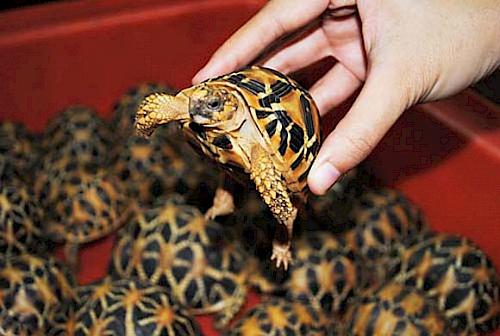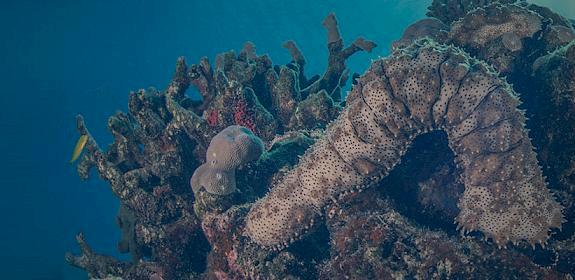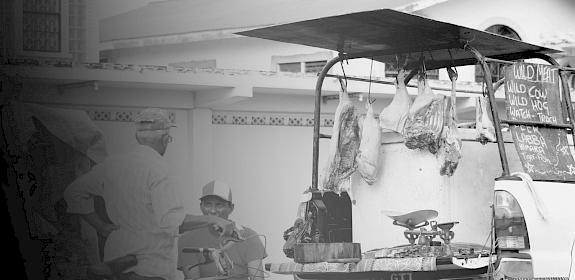Community-led solutions: key force in tackling wildlife crime
Muldersdrift, South Africa, 2nd March 2015—On the eve of World Wildlife Day (March 3) a set of recommendations on engaging communities in combating the illegal wildlife trade (IWT) at the source has been issued by a group of more than 70 researchers, community representatives, government officials, UN agencies and NGOs from five continents.

The recommendations will be taken to the UN conventions on the international trade in endangered species (CITES) and on biological diversity (CBD) and to the high level IWT conference in Kasane, Botswana later this month2 and include:
• Recognising the central role of the communities that live close to wildlife in addressing and combating IWT
• Seeking to understand and respond to community rights, needs and priorities in designing anti-IWT initiatives
• Recognising the distinction between IWT and legitimate, sustainable use and trade of wild resources
• Supporting the devolution of wildlife access, management and stewardship rights to the lowest appropriate level
• Encouraging the development of partnerships between communities, conservation NGOs and law enforcement agencies in tackling IWT
Entitled Beyond enforcement: Communities, governance, incentives and sustainable use in combating wildlife crime, the symposium looked at ways to engage those communities living side by side with the world’s wildlife, to protect key species targeted by the illegal trade while securing their own futures.
Dr Rosie Cooney, Chair, IUCN CEESP/SSC Sustainable Use and Livelihoods Specialist Group said: “community-led approaches to combating wildlife crime are often overlooked in the international conversation on how to end wildlife crime and the outcomes from the symposium show that many of these approaches hold the key to truly finding a solution to this illicit trade.”
Case studies of frontline experiences across Africa, Latin America and Asia from those communities on the sharp end of the illegal wildlife trade chain were shared, as well as innovative research from around the world on a diverse range of subjects from the economics of the illegal wildlife trade, to using criminology theory to understand what drivers trigger wildlife crime.
The South African Minister of Environmental Affairs, Minister Edna Molewa, addressed the symposium attendees, including government representatives from Austria, Botswana, Germany, Namibia, Tanzania, the UK and US.
Nick Ahlers of TRAFFIC said: “Engagement of communities is crucial for success in reducing poaching and the illegal wildlife trade. We are right now in the grip of a poaching crisis, with many countries currently in the process of implementing their National Ivory Action Plans, so the Beyond Enforcement symposium recommendations are incredibly timely and relevant.”
The illegal wildlife trade is becoming ever more pervasive and increasingly impacting on human livelihoods and species conservation. In recent years it has grown more sophisticated and dangerous.
Despite the global attention on wildlife crime, 3 the international responses to date have largely focussed on strengthening law enforcement efforts and reducing consumer demand for illegally sourced wildlife commodities. Much more emphasis must now be placed on the role of indigenous and local communities, and this needs to be included as an important issue in the context of wider discussions around sustainable development.
Dr Dilys Roe, Biodiversity Team Leader at the International Institute for Environment and Development (IIED) said: “Approaches based on trust building, engagement and empowerment of communities, which enhance the social and economic benefits of conservation, are just as vital as enforcement to tackling wildlife crime. People should be able to profit from activities such as wildlife tourism and sustainable use while protecting species targeted by illegal trade.”
Wildlife can be an important asset for rural communities, providing a foundation for investment and economic development – for example through tourism or trade in forest products. Depletion of this asset as a result of illegal trade undermines this foundation, limiting options for local and national sustainable development.
The organisers hope the symposium’s crucial learnings for creating an inclusive approach to combating the illegal wildlife trade will be shared with other sectors outside the conservation world that could benefit from successful community approaches to tackling poaching.
The symposium has been organised by the International Union for Conservation of Nature (IUCN) CEESP/SSC Sustainable Use and Livelihoods Specialist Group (SULi), International Institute of Environment and Development (IIED), Austrian Ministry of Environment, the University of Queensland / ARC Centre of Excellence for Environmental Decisions (CEED), the North West University (South Africa) – African Centre for Disaster Studies and TRAFFIC - the wildlife trade monitoring network.
The organisers are grateful to the support provided to the symposium by GIZ and USAID.
Notes:
THE GROUP RECOMMENDATIONS IN FULL:
Governments, international organisations, NGOs, development agencies, donors, and policy processes, when developing and implementing approaches to address IWT, should:
• recognise the central role of the communities that live close to wildlife in addressing and combating IWT
• seek to understand and respond to community rights, needs and priorities in designing anti-IWT initiatives
• recognise the distinction between IWT and legitimate, sustainable use and trade of wild resources
• recognise that forms of sustainable use that involve removing individual animals from a population have resulted in major conservation successes for some species that are currently the focus of IWT
• support the devolution of wildlife access, management and stewardship rights to the lowest appropriate level
• encourage the development of partnerships between communities, conservation NGOs and law enforcement agencies in tackling IWT
• recognise the role of the private sector, and community-private sector partnership, in generating the benefits from wildlife that support community engagement in conservation
• recognise the central role of benefit flows from wildlife and conservation in counteracting the incentives and generating the revenue to engage in IWT
• recognise and support the value of trophy hunting as an important generator of benefits to counteract the incentives for poaching and IWT in many contexts
• ensure enforcement efforts are sensitive to potential negative impacts on local communities and are accompanied by appropriate accountability mechanisms
• not applying sanctions that can undermine positive incentives for communities to work with governments in combating IWT
Governments and international should:
• recognise, support and provide an enabling environment for the ability of communities to benefit from conservation and sustainable use of wildlife as a means to combat IWT
The symposium was supported by the Austrian Ministry of Environment, the United States Agency for International Development (USAID) and implemented in co-operation with GIZ, on behalf of and financed by the German Federal Ministry for Economic Cooperation and Development (BMZ).




